Cold Winter
Better than Killzone and Rogue Agent! Phew...
"Anti Social, Anti Normal, Anti Bond, Anti Hero...It's a bitter, cold winter."
It most certainly was a case of Brass Monkey here in Blighty until recently, and don't Swordfish Studios know it? Based up in 'sunny' Birmingham, the veteran Britsoft team (behind the acclaimed PC action-strategy title Hostile Waters) know more about the kind of climate that confines us to the indoors for much of the year.
But there are side benefits to living in a part of the world where the sun hides behind cloud for the majority of the year. For one thing, we get the fruits of their labours while they're all stuck slaving away over their keyboards, and the product of the last three years is nearly upon us in the form of Cold Winter, a gritty PS2-only FPS that pushes Darth Vader's toaster to new heights, apparently [on top of the oven? -Ed]...
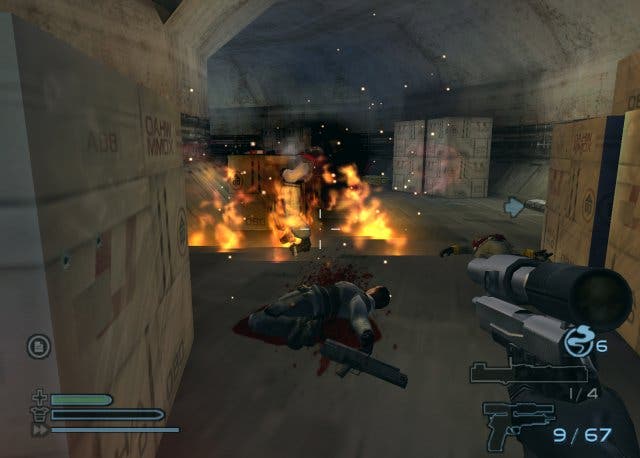
Now, before you roll your eyes and mutter, we all know there are rather more console shooters around than we care to mention, but Swordfish might just have one worth paying attention to, if you believe the game's American producer Ian Stephens - a man who has overseen some of the greats in the genre from Quake II to Riddick.
Out on June 3rd via publisher Vivendi-Universal, Cold Winter is set in "a dark world of global espionage", full of "international intrigue, action and suspense". Featuring 13 levels across eight distinct environments that are "as gritty as they are beautiful", you'll crawl through the "dank hopelessness" of a Chinese prison, to the "exotic beauty" of Cairo and Hong Kong.
Stephens happily admits it "won't change your life" but VU has had the good sense to release it when sod all games are being released, so expect to hear more about Cold Winter shortly. Meanwhile, over to Ian...
Cold Winter has been in development for about three years now and players assume the role of Andrew Sterling, an SAS soldier who has joined MI6, who's on a mission in China and was caught and thrown into a political prison. He's been disavowed by the British government and essentially left to be executed when some friends of his in power break him out and ask him to become involved in an effort to thwart nuclear genocide.
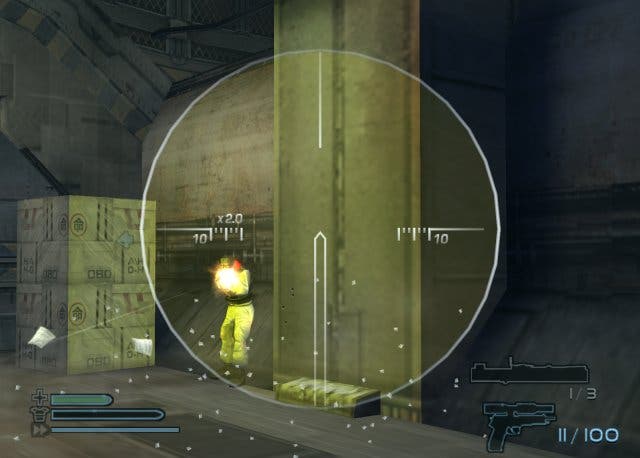
Yes a present day, very modern context.
Well, it spans several locations throughout Asia and Europe. You start the game in China, from there you'll move to Egypt, at certain points you'll visit South Africa. It's a pretty worldly game, and these are all based on the actual places where all of this happens, so it's inspired by real life and a real world context.
We've done an awful lot with the technology. We've taken the Renderware engine to heights it probably hasn't reached on PS2. I think even Criterion will be impressed with what we've managed to do. We've generally focused a lot on the feel of the play. We fundamentally wanted this to be a very easy game to pick up and get into and then infuse the things that make PC shooters great - that gritty, tactile feel of the play and the precision of control. So we wanted to turn a hallmark shooter experience into something with greater control, and we've embellished that with things like the Karma physics engine which is so capable that we've started to get feedback from journalists making comparisons to Half-Life 2, which is grand. I don't know if I'd be that bold even, but that's the observation that's been made. You can do virtually anything with any object in the world whether it's using different cover and tossing it to use it as a distraction or using it as a makeshift shield, whatever it is. There's utility and interactivity everywhere.
Well, there's a big debate about whether or not single-platform development or multi-platform development is what's best for a new franchise. People in sales and marketing tend to think if you get it out everywhere there's a greater chance that it will reach a wider audience and there are more sales. But inevitably if you focus on a single platform that means more time and more resources are going into the game itself and not the extensibility of your engine. So for us it was an opportunity to focus on the resources and focus on the quality of the game and have people dedicated to pushing the technology of the PS2, you know, cramming the most that we could into and out of the hardware, rather than worrying about god knows how many SKUs.
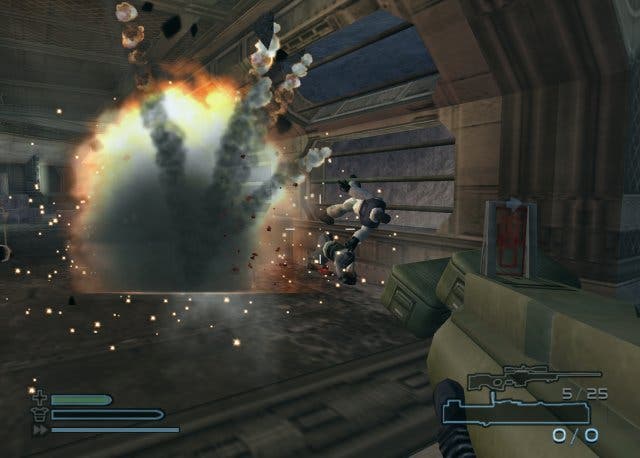
That's an interesting question. I'll limit us to shooters, because I think the last year has been really interesting for shooters, on PS2 particularly. A lot of people have promised gamers the world. You know "Halo killers", the return of GoldenEye [arches eyebrow]. I don't think any of that bore out, I don't think anyone believed in that, so we've been really careful not to promise that we're going to change people's lives.
We're going to promise that we'll give them an entertaining experience, and it's really incidental that we do a lot of things real well. Those games suffered with the lack of control... just the way the game feels. Some of these other games, it was like you were eating a brick - you couldn't blow anything up, you couldn't push anything around, you couldn't even jump in some of them. You really felt like you had no autonomy, and it felt so rigid and scripted, and it was entertaining to some extent, but there was no euphoria there. It just didn't feel like a great shooter, and so we focused on the finer points that would bring that out, the playability, the more than 30 weapons we created, and how different each of them are.
You know, in shooters it's really traditional and popular for people to grab the big gun and stick with that, but there's an incentive in Cold Winter to try everything, these balances are real polished.
We support four players via split screen, eight players online, broadband only. We support voice chat, so players can use their headsets. Probably the most unique aspect of the online is a) just how easy it is to get in there and play, it's very simple, and b) the characteristics of the single-player game carry over, so the physics, the ragdoll, the dismemberment as well as the playability, just the feel, what it's like to use all those different weapons in multiplayer and how intense that is, and then the customisation.
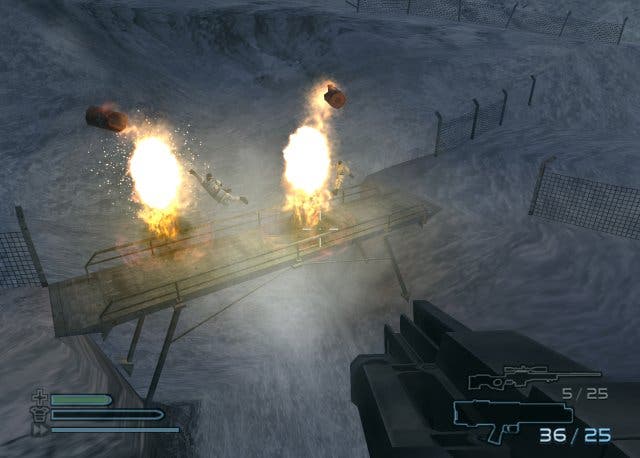
When we announced and unveiled the online game we gave a demonstration and ad hoc asked people to suggest what kind of multiplayer game they would want to play, and some were saying 'customise it something like Counter-Strike' or 'can you make it like Rocket Arena?' and we were able to do all of that with simple options that we put in the game. It's very player-driven. If you want your mindless Deathmatch, small arms battle, or classic head match - which no-one's seen in, like, 11 years - then that's in there. It's whatever you want it to be. It's just fun. Plain fun.
I personally think it's an unusually rich story for an FPS.
Actually yes. The lead character is voiced by Tom Baker of Doctor Who/Little Britain fame. It'll be interesting to see how people from Europe react to this game as it's really a game for you guys. It was made by a British developer; Swordfish Studios in Birmingham, a great group of guys, extremely talented. When it's done, if anyone likes it, bow in their direction because these guys have really worked hard to make this game. It's for the European audience. I think the American gamers will appreciate it for being different, fresh, and something far removed from the fantasy/James Bond world which I think we're maybe over at this point. For the Europeans it's a pat on the back for you guys.
It's a pretty lengthy shooter. Hardcore gamers will probably get through it in about 12 or 13 hours, and I think the more casual gamer will take more like 16 or 17 hours.
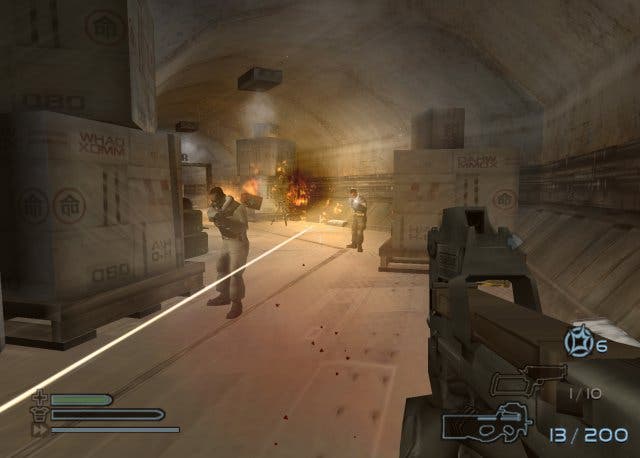
It's a huge challenge.
I think the best thing that you can possibly do is concentrate on making a good game. There's a cost of entry into that market place. You want to create a new IP, and you have to make sure everybody knows about it, so there's not only the cost burden of creating a game, but there's a significant cost in actually marketing that, publicising it and just getting it out there, making sure people are aware of it. And those are all tricky things to do. But if you can make a great game and people fall in love with it, people say it's great, tell their friends it's great, that can come back and reward you.
You can get the other things right and then if you don't have a great game - which is what's happened with games over the last eight months.
It's a tough audience! I'd be more confident trying to fake a British accent - but I wouldn't offend you with that - than to say we're going to do extremely well. You never know. My last project was Riddick, and when that game was done, we had some confidence that we were going to offer people something new, but you just never know, you really never know.
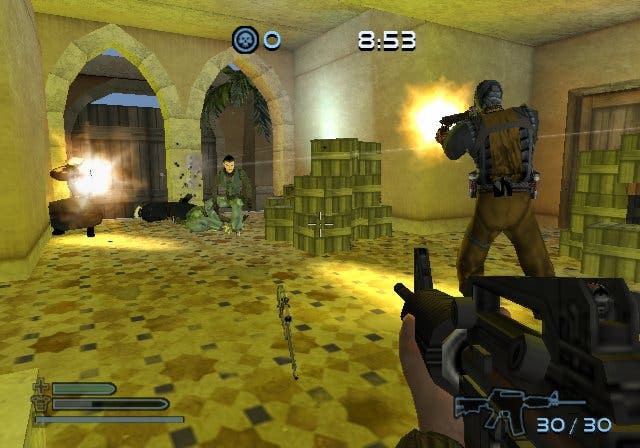
Well, as a producer, most things are my responsibility. It's kind of my job to make sure the project is done on time, is done on budget, that we get the level of quality we're looking for, so I'm paying attention to everything.
Pretty much. If everyone working on the game is a family, then maybe I'm Papa! That said, there is never one person that makes a game great. It's always a team effort, and I would never want to say that, you know, if any one person deserves particular credit, if anything the guys at Swordfish deserve that praise. I've been working on shooters for eight years now, I have a long history in that genre - Hexen II + expansion, Quake II, Heavy Gear II, Riddick, to name a few.
That's a great question! And I'll tell you what; it's not fair to stack these up side by side. The way I look at it is, when you look at what we've had to compete with, in terms of other PS2 shooters, there has been a ridiculous amount of money thrown at these projects, people have had excessive amounts of time, and team sizes in excess of 100 people.
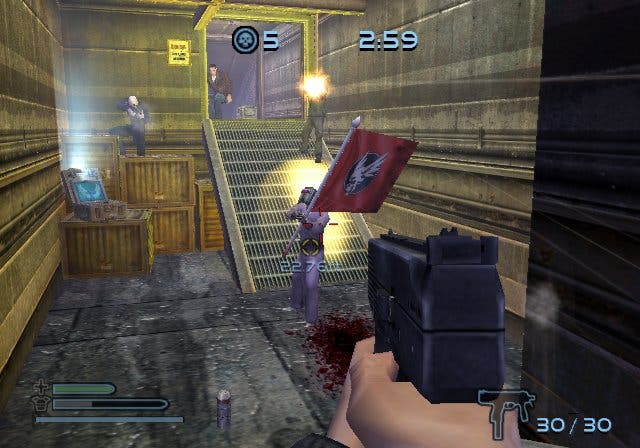
Swordfish is a 21-man team. They're the last great garage team I know of, right? We didn't spend millions and millions of dollars on this game, and if we come out on time, and if we come out on average better than something like Killzone or Rogue Agent, if we manage to outdo people who had tenfold, in many cases, the resources at their disposal, then that's great. To me we that means we have to have a lot more passion, we had to pay a lot more attention and work harder. We fought for that, and we've spent years of our lives working on this game, so that's a very meaningful thing. And when I look at what it was like to make any of these other games I'm satisfied. I think we've done great with what we've had, and I think it stacks up well in terms of the effort.
Cold Winter is due out on PS2 this June 3rd.

